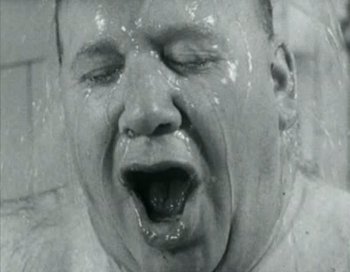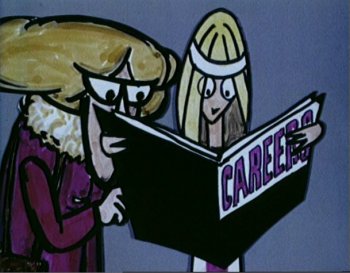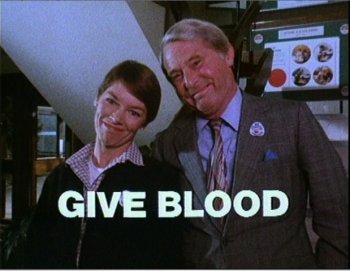The Good Old Days? - General Advice
Although the prospect of seeing someone come a cropper is part of the cheap thrill of many PIFs (oh, just me, then) they weren't just there to show off impressive stunts. Believe it or not, PIFs giving general advice can be just as good as watching someone make an unscheduled trip through a windscreen, especially when Richard Massingham is in them.
 |
Five Inch Bathers/Watch Your Meters (1947)
One of the greatest sources of depression among post-war Brits was that coal, a vital source of fuel, wasn't taken off ration until 1958, a full 12 years after WW2 had actually ended. It's one thing to accept rationing when your life, family and very way of life is in grave danger, but it was hard for the British to feel like victors when they had Richard Massingham exhorting them to 'watch their meters' and bathe in only 5 inches of water. Of course, it's interesting to find ourselves being given similar messages today, all because of the excesses of our parent's generation.
Be a Blood Donor/Blood Donors - VOX POP/Scottish Blood Donors - Willie and Mary (60s)
A young lad is rushed to hospital, whilst a voiceover tells us that we'd all agree to give him a blood transfusion if we were asked at that moment, so there's no excuse for not giving blood. The Vox Pop PIF exposes the many misconceptions around how long blood can be stored (it's actually 35 days for red cells and 5 days for platelets now, although when this PIF was made, blood was stored for up to 3 weeks), and asks us all to give blood to make up for the short storage period. The Scottish PIF takes a slightly different tack, telling us how Willie's blood donation saved the life of Mary, who slipped and cut her wrist on glass. The advent of foreign travel and AIDS has meant that there are now more rules around who can give blood, but it's no less important.
Childrens' Society - Aunts and Uncles (60s)
Young Joe, who lives in a children's home, is waiting to be taken on holiday by Mr and Mrs Blake. The exact time is given to emphasise how important this outing is to Joe, and how anxious he is that they are a little late. The voiceover explains that Mr and Mrs Blake have taken Joe out a few times now, and that he now trusts them enough to go on his first family holiday with them. It isn't quite clear whether Mr and Mrs Blake are planning to adopt Joe, as the voiceover refers to them being like an aunt and uncle to him, but the appeal for more uncles and aunts is straightforward enough.
When In the Country (1963)
A rather charming short film (probably shown mainly in cinemas) advising people on how to behave on days out to the countryside, and warning them of the consequences to others if they behave badly. It contains the great phrase "People who let their dogs run beserk in the country are often not much better themselves." which would never be used in government communication today. The animators also seem quite keen on showing a half-naked woman whenever they think they might get away with it. The warning about not picking wild flowers is interesting considering that this is now illegal. Modern advice is available here.
Safeguarding Water Supplies (1965)
A PIF warning about how easily it is to contaminate water, and that it is often taken for granted. It states that many 'country folk' still depend on streams and natural springs for their water, which is probably not the case today.
 |
£5 In Notes (1949)
Richard Massingham demonstrates the rule of taking a limit of £5 overseas by acting as if he's 'a bit simple'. The link to the PIF explains the background.
Keep It to Yourself - Roy Hudd (1968)
This was part of the 'Keep It to Yourself' campaign by the Keep Britain Tidy group, which presents an group of Litter Defence Volunteers chasing a littering Roy Hudd around the then new and shiny council housing of the future. Sadly, it was to become the sink housing of tomorrow, and A Clockwork Orange almost seems a dark parody of this PIF. Perhaps Stanley Kubrick had seen it, and laughed his head off.
Pipe Bursts (1969)
A family demonstrate the various measures you should take when a pipe bursts in the home. It's all fine and dandy, but there's some unintentioned hilarity when the family pose still at the end. The camera lingers on them for a bit too long, and the little girl loses concentration; she looks to the side and smiles.
Country Parks (70s)
Remember that funny symbol which looks like several people jumping up and down? That's the symbol for a country park, that is, and you can have a jolly day out in one. Oh, and why not take a picnic?
Jobs for Women (1970)
HM Government, in a big parade, help a housewife with frustrated career ambitions. Her neighbours practically attack her for the information, giving the impression that in 1970, Britain was full of housewives who wanted to work, and that staying at home wasn't a satisfying alternative. It's a bit surprising that the COI are that committed to radical feminism at this point, and I actually suspect the rather sexist assumption that housework is worthless is actually behind this, despite the crucial role it plays in keeping our lives running smoothly.
Jobs for Early School Leavers (1970)/Colleges of Further Education (70s)
'Early school leavers' presumably meant those leaving education with little or no qualifications. This PIF encourages them to think seriously about their career options, which were actually meaningful back in 1970. Nowadays, those who aren't academic have a tougher time of things, and the supposed plans of the government to make students stay on until the age of 18 seems to be blissfully ignoring the fact that many teenagers have had their fill of education way before then. It rather seems to be trying to sidestep the uncomfortable reality of the modern British economy; which is that unskilled jobs are almost all either dead-end and/or in the service industry. If you're not really suited to dealing with customers; tough luck, mate. Just as well for colleges of further education, eh?
 |
Jobs for Young Girls (1970)
Well, this was probably considered forward-looking at the time, but the advice to parents to encourage their daughters to prepare for a rewarding job to go back to after having raised a family is patronising, and a little naive. Although legally this isn't meant to happen, it's still widely accepted that having children will damage a woman's earning power when compared to a man of a similar age in a similar career. Unless the PIF had fairly low expectations of what a 'rewarding job' consisted of. Which, actually, was probably the case. The past, there.
Polystyrene Tiles (1970)
Polystyrene tiles are safe. Gloss paint is safe. But together, they are a very serious fire hazard...because the two combined are extremely flammable. Poor Mr and Mrs Arnold Finney.
How to Vote at a General Election (1970)
A straightforward PIF, which does as it says on the tin. I've heard this was to encourage women to vote and to reassure them that they didn't have to vote the same way as their husbands.
Jo and Petunia - Country Code (1971)
Tsk. Jo and Petunia cause chaos in the countryside, upsetting a farmer. This PIF does assume that viewers know the serious consequences of copying their actions, but I guess they had all seen 'When In the Country' at the cinema.
1971 Census (1971)
A PIF explaining the purpose of the census taken every 10 years in the UK (to decide how the country's resources are best allocated for the next 10 years), and some perfunctory reassurance around the storage of personal data, way before the Data Protection Act was ever thought of.
School Leaving Age (1971)
It's an odd thought that the original school leaving age at the start of the 20th century was 11, which was increased to 14, then 15, but not increased to 16 until 1972. 35 years later, there's talk of raising it to 18, but some could well argue that it's simply a reflection of the shinkage in demand for unskilled labour over the past century, due to globalisation and automation. Certainly, there seems fewer and fewer jobs for those 'good with their hands', which isn't really a good thing. What will the unskilled do in the future, when even shelf-stacking jobs rely on some familiarity with technology?
This Is an Emergency (1972)
Right. Here's the situation. You WILL get seen in a casualty ward, but others who are in greater need of help than you will take priority. Deal or No Deal? The depressing number of medical staff assualted in Accident and Emergency units nowadays would suggest that some of the population are choosing to No Deal.
 |
Decimal Currency - The System (1971)
The decimalisation of Britain's currency (fairly unpopular at the time) is explained. It wasn't until I picked up a booklet from the same campaign that I actually began to understand how the old system worked. Frankly, the decimal way of doing things seems a lot easier to understand, which is why I've never had much sympathy for 'metric martyrs'. If the nation's children have been taught in metric units and decimal currency, why hang onto systems they don't understand?
A rather marvellously patronising PIF for the same campaign is here, and an interesting Australian PIF on the same topic is here.
Keep Britain Tidy (1975)
Sometimes the simplest imagery is the best. The very successful Keep Britain Tidy campaign hit the heights with straightforward PIFs like this; the unveiling of a filthy Britain to show the consequences of not keeping it tidy, to the closing chorus of Harry Secombe singing 'Jersualem'; "For we shall build Jersualem/In England's green and pleasant land". It probably didn't go down quite so well in Scotland, Wales and Northern Ireland.
Save It! - Delia Smith/Barry Bucknell (1976)
Britain's favourite cook explains how she cooks every part of her evening meal together to save electricity. Which is great, if you're fond of your bread and butter pudding tasting of garlic. The DIY expert Barry Bucknell also wades in to tell us to turn our thermostats down for the 'Save It!' campaign. It's interesting that this advice is being repeated nowadays to encourage us to reduce carbon emissions.
TV Licence - Colombo (1977)
Ah, this old chestnut. The government used to like to scare the populace into paying for their TV licence by claiming they could detect who didn't have a licence with a detector van. In reality, checks are more easily made using records and home visits to suspected licence cheats.
 |
Blood Donors - Glenda Jackson and Ernie Wise (1980)
In an unlikely move, Glenda Jackson is tricked into giving blood by Ernie Wise. It's watchable enough, and does point out that it's not painful, which appears to be a common fear. Do give blood if you can, folks. Rowan Atkinson also did a PIF for the Blood Transfusion Service.
Switch Off Something/Energy at Risk/Motor Fuel Coupons (1973)
These were produced as part of the UK Government's reaction to the fuel crisis of the winter 1973/1974 (explained on the link to the PIF). Motor Fuel coupons were planned and PIFs made, but I believe that coupons were not actually used. Motorists were also encouraged to drive at 50mph or not drive if they could help it in order to save fuel. The fact that our parents didn't continue these actions through the 80s and 90s mean that our generation are being given the same advice.
Statutory Sick Pay (c1982)
The phrase "Britain's new sick pay scheme is now law" presumably means that the Victorian philosophy of bleeding the workers dry lasted well into the 20th century. Scandalous.
The Cleveland Way/The Ridgeway (70s)
This is advertising a particular path across the Cleveland area in the North Riding of Yorkshire, telling us about its history and the sights to be seen on this long-distance footpath, promoting the acorn symbol that is still used to today to mark the route of these paths. The Ridgeway is a similar path.
Millenium Bug (1999)
The fuss made over the challenge to computer programs by the year 2000 was quite incredible in hindsight. Of course, the decision to use only 2 digits to represent the year was short-sighted, but understandable when memory was at a premium. The main fuss was a result of widespread ignorance in Britain's industry about the nature of computer programming; let's not forget that the generation making the decisions grew up with the idea that people who used computers were 'nerds'. Naturally, those 'nerds' made an awful lot of money putting the problem right. Also, it's the only modern-day PIF in the collection; it's one hell of a jerk when the preceding PIFs are black and white!
General advice PIFs are very easy to come by nowadays on YouTube, should you want the fix.
About this entry
- By Tanya Jones
- Posted on Tuesday, June 17 2008 @ 7:48 pm
- Categorised in TV, Analysis
- Tagged with PIF
- 3 comments

An earlier TV licence one: http://www.bbc.co.uk/archive/bitsinbetween.shtml?chapter=9
By Somebody
June 20, 2008 @ 3:53 pm
reply / #
I'd rather TV License ads were a bit more light and humourous like those old ones. I can't stand the current ones which seem to suggest the BBC are some sort of loanshark types looking to kick your door in.
By Zagrebo
June 20, 2008 @ 3:57 pm
reply / #
It's terrific, isn't it? I wonder how many lonely men didn't pay their licence in the hope one of those beauties would knock on his door?
By Tanya Jones
June 20, 2008 @ 4:03 pm
reply / #